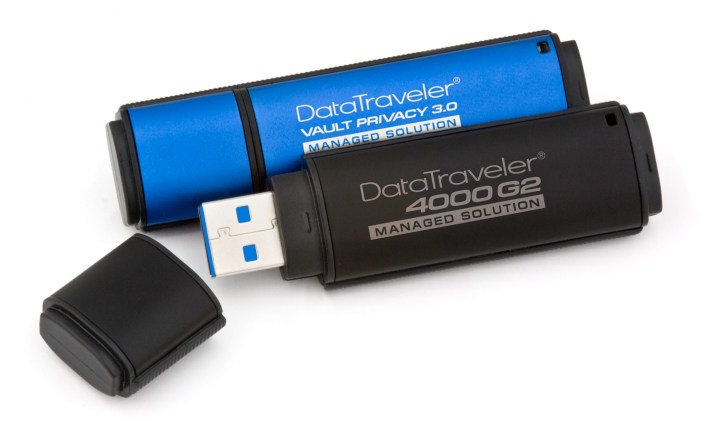
According to Kingston, the 4000 G2 model is FIPS 140-2 Level 3 validated while the Vault Privacy model is FIPS 197 certified. Both feature 256-bit AES hardware encryption and have an option to come packed with tools developed for DataLocker’s SafeConsole Encryption Management Platform. This suite includes software for managing the password, taking an automatic inventory, changing geolocation features, providing a “remote kill” function for wiping the drive remotely, and more.
The drives are served up in 4GB, 8GB, 16GB, 32GB, and 64GB capacities. They’re also based on USB 3.0 technology, meaning users can move files back and forth faster than if they’re plugged into a USB 2.0 port. Thus, both drives provide reads speeds of up to 250MB/s and write speeds of up to 85MB/s on a USB 3.0 port. When connected via USB 2.0, read speeds are up to 30MB/s and write speeds are up to 20MB/s.
The specs show that these drives can be submerged in water up to, or down to, a depth of four feet, and require two free drive letters each when connecting to a PC. However, the Vault Privacy model includes optional built-in anti-virus protection from ESET although the software isn’t compatible with the Mac OS and Linux platforms.
Kingston says that the 4000 G2 model features a tamper-resistant seal and will automatically lock down and reformat itself if ten attempts to access the stored contents have failed. The drive can serve as a read-only device as well to reduce the risk of malware jumping on and infecting not only the contents but other PCs in the process.
Like the 4000 G2, the Vault Privacy model provides the same lock-down and read-only features. However, with the built-in anti-virus software, users aren’t required to install the security software on a PC. Even more, the software’s engine provides instant alerts as well, immediately informing the drive’s user of a potential threat to the files.
“Human error, malicious attacks and technical failures can place employee and corporate data at risk. Companies, agencies, and organizations need to implement a security policy well before anything goes wrong as it’s critical to prevent non-compliance, fines, and even financial loss,” said Ken Campbell, Flash business manager for Kingston.
The two drives arrived after Kingston Digital acquired the “IronKey” USB technology and assets from Imation back in February. The company said the IronKey brand would be added and integrated into Kingston’s line of DataTraveler encrypted USB drives. Meanwhile, DataLocker purchased the IronKey Enterprise Management Services platform, strengthening its relationship with Kingston.
Kingston plans to launch “Kingston IronKey” as the company’s top of the line brand for drives with FIPS 140-2 Level 3 certification in the near future. The company said that it will still maintain its encrypted DataTraveler products for customers who do not need FIPS 140-2 Level 3 validated storage solutions. Seems as though the 4000 G2 model is an exception.
Pricing for the DataTraveler 4000 G2 starts at $37.50 for the standard or managed version. The DataTraveler Vault Privacy 3.0 model starts at $24.70, and is offered in standard, anti-virus protected, and managed models.


